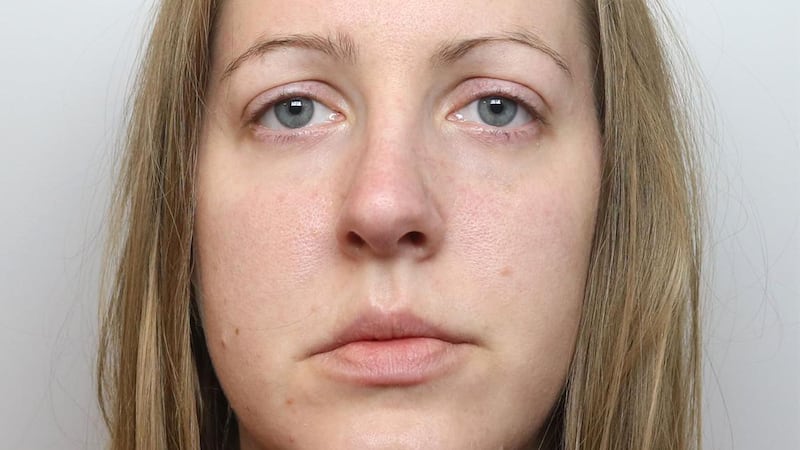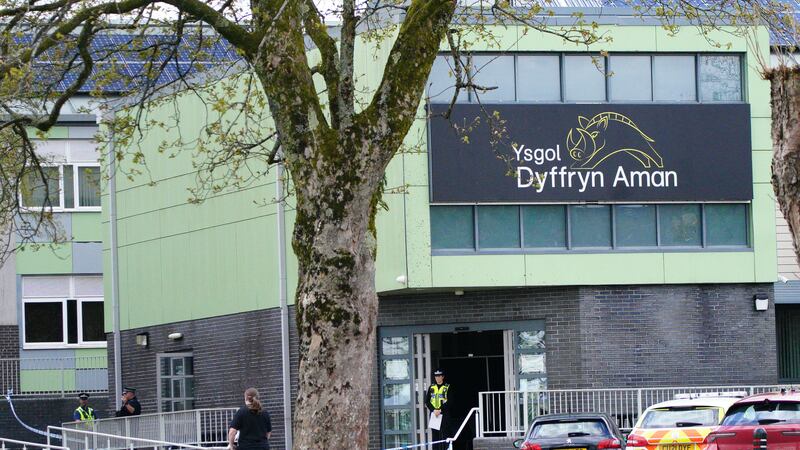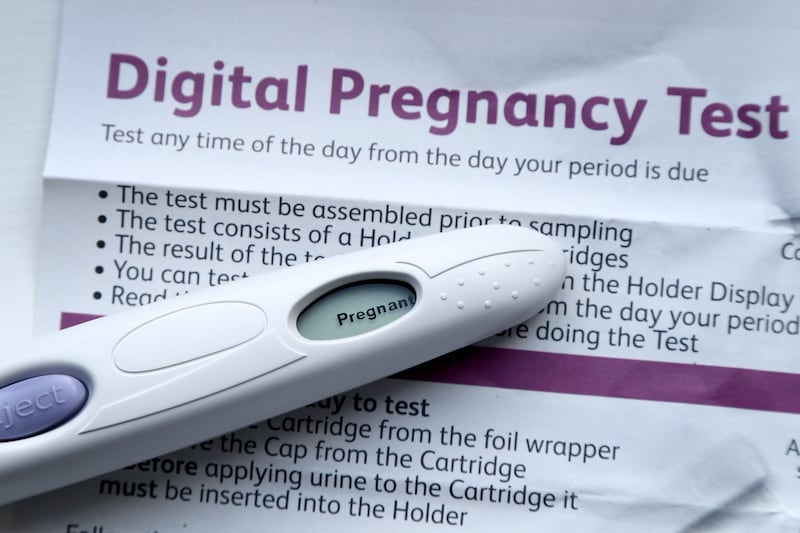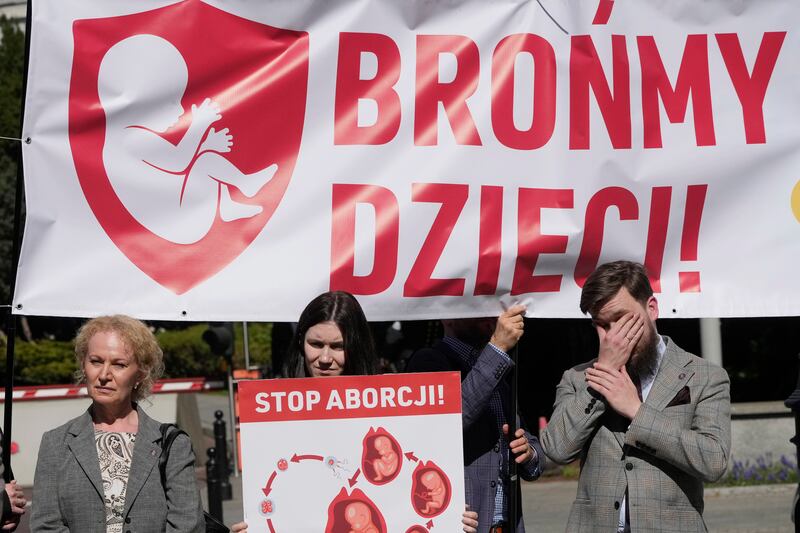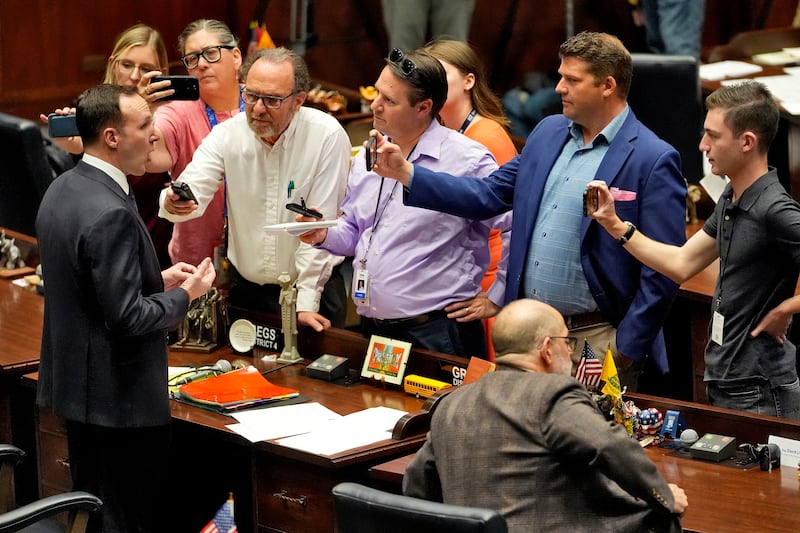Northern Ireland's strict abortion laws are incompatible with human rights legislation and need "radical reconsideration", the UK's highest court has urged.
A majority of a seven-strong panel of Supreme Court justices ruled the Northern Ireland Human Rights Commission (NIHRC) had no legal standing to bring its challenge against the abortion law.
But, by a majority, the judges also strongly expressed their opinion that the current laws are incompatible with article 8 of the European Convention on Human Rights (ECHR) - the right for respect for private and family life.
Deputy Supreme Court president Lord Mance said the present law "clearly needs radical reconsideration" and that the opinion of the court - while not legally binding - "cannot safely be ignored".
“All eyes are now on Theresa May”@AmnestyNI’s @GTeggart says she is ‘delighted’ that a majority of Supreme Court judges felt the abortion law in Northern Ireland was incompatible with human rights law.
— Catrin Nye (@CatrinNye) June 7, 2018
This is despite campaigners losing their appeal pic.twitter.com/F6JdFUrAuG
Lord Mance said in a lengthy written ruling: "I am, in short, satisfied that the present legislative position in Northern Ireland is untenable and intrinsically disproportionate in excluding from any possibility of abortion pregnancies involving fatal foetal abnormality or due to rape or incest.
"Those responsible for ensuring the compatibility of Northern Ireland law with the Convention rights will no doubt recognise and take account of these conclusions, at as early a time as possible, by considering whether and how to amend the law, in the light of the ongoing suffering being caused by it as well as the likelihood that a victim of the existing law would have standing to pursue similar proceedings to reach similar conclusions and to obtain a declaration of incompatibility in relation to the 1861 Act."
Watch the Supreme Court's ruling in full
Giving his opinion, Lord Kerr praised three "enormously brave women" who gave "unsparing accounts" of having to deal with a pregnancy where they knew their babies were "doomed to die".
He said: "No-one who heard those accounts could fail to be moved by the courage of those women.
NI Human Rights gives its reaction to Supreme Court ruling - says politicians need to bring NI abortion law out of 19th century @UTVNews pic.twitter.com/P2s5ibpTHe
— Judith Hill (@JudeHill_utv) June 7, 2018
"Nor could they fail to have profound sympathy with the terrible ordeal which they had to endure."
The judge said the court had to carry out a "dispassionate analysis" of the difficult legal issues, but that the "nature of their suffering and the trauma of their experiences were by no means irrelevant" to the court's decision.
He said that, where it is clear a foetus is suffering from a fatal abnormality, there is "no justification" in inflicting on the mother the "appalling prospect" of having to carry it to term.
En route to the Supreme Court London #weneedchange @JaneChristie9 @GTeggart @darraghmackin pic.twitter.com/E75xO662Up
— Sarah Ewart (@MrsEtoB) June 7, 2018
The judge added: "Put simply, the balance cannot come down in favour of a law which imposes that experience on a woman.
"Quite apart from other considerations, the imposition of such a law fails to give any weight to the personal autonomy of a woman and her freedom to control her life."
He also said the blanket ban was "disproportionate" in cases of rape and incest, adding: "To require in every instance a girl or woman to carry to term a foetus which was the consequence of exploitative and abusive behaviour and which is utterly abhorrent to her could not, we concluded, be considered as having struck the right balance between her rights and those of society."
Early morning start to return to Supreme Court with @GTeggart @MrsEtoB @JaneChristie9 for the Judgment on #abortion in N.Ireland. #DecrimNI #humanrights pic.twitter.com/h6b4WyGpWA
— Darragh Mackin (@darraghmackin) June 6, 2018
The justices said that because of their decision on the standing of the NIHRC, the Supreme Court "has no jurisdiction" in the proceedings to make a declaration of incompatibility.
Explaining why the commission did not have power to bring the case, Lord Mance said: "In summary, the present proceedings were not instituted by identifying any unlawful act or any actual or potential victim of it."
During proceedings in October last year, the NIHRC told the court the current law criminalises "exceptionally vulnerable" women and girls and subjects them to "inhuman and degrading" treatment.
On their way into UK Supreme Court, Amnesty’s @GTeggart and Sarah Ewart @MrsEtoB, intervenors in the Northern Ireland abortion law case, share their hopes.
— Amnesty Int'l NI (@AmnestyNI) June 7, 2018
via @euronews pic.twitter.com/vP8dMz0Ou5
A QC representing the commission argued that human rights were being breached, with those affected being forced to go through "physical and mental torture".
The Supreme Court was asked to rule that a prohibition on abortions where a pregnancy arises from rape or incest, or "involves a serious foetal abnormality", is unlawful.
Contesting the appeal, the Stormont Executive's senior legal adviser, Attorney General John Larkin QC, said Northern Ireland's criminal law on abortion is a matter for the "democratic judgment" of the legislature.
The legislature, he said, "has struck the proportionate balance required for the protection of the rights of women and unborn children".
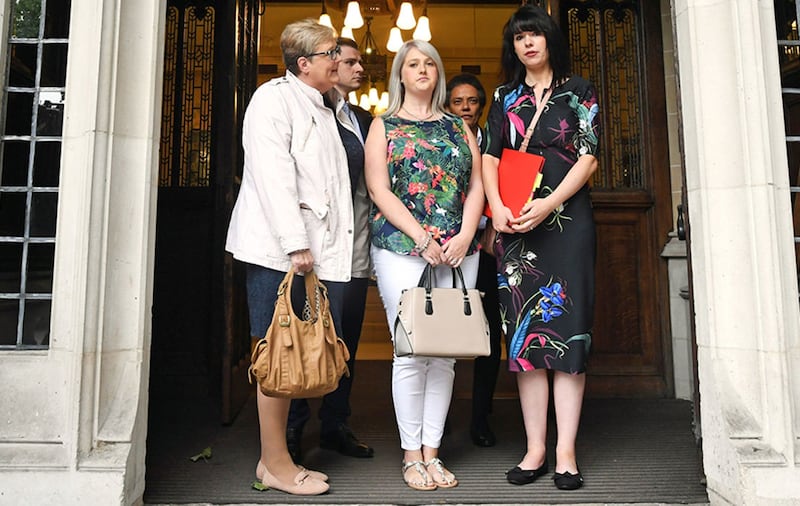
Submissions were also made at the Supreme Court by a number of bodies, including seven of the UK's leading reproductive rights organisations, Humanists UK, Bishops of the Roman Catholic Dioceses in Northern Ireland, the Society for the Protection of Unborn Children and Amnesty International.
Unlike other parts of the UK, the 1967 Abortion Act does not extend to Northern Ireland.
Abortion is illegal except where a woman's life is at risk or there is a permanent or serious danger to her mental or physical health.
Anyone who unlawfully carries out an abortion could be jailed for life.
The Stormont assembly voted in February 2016 against legalising abortion in cases of fatal foetal abnormality and rape or incest.
Following today's ruling, pro-choice campaigner Sarah Ewart, who left Northern Ireland for a termination in England in 2013, said she would be taking a case, supported by Amnesty International, to the Belfast High Court, seeking a 'declaration of incompatibility' of NI abortion law with UK's human rights obligations.

A spokeswoman for British prime minister Theresa May said: "The judgement will now be carefully considered.
"But, as we have said repeatedly, we want to see a devolved government restored so that locally elected, democratically accountable politicians can debate the fundamental changes to policy on abortion.
"Abortion raises complex human rights issues and that's been recognised by the court when negotiating these matters and we recognise there are strongly held feelings on all sides of the debate.
"Our focus remains on getting the devolved administration back up and running so they can take decisions on matters like that."
Sinn Féin's leader in the north Michelle O'Neill said today's Supreme Court ruling is "further evidence that we need to change the law in the north of Ireland and stop failing women".
Speaking after a meeting with Labour MP Stella Creasy, Ms O'Neill spoke of a momentum building in Northern Ireland following the recent referendum vote in the Republic to change the laws around abortion.
Ms O'Neill said she would "love to be" in the Stormont assembly tomorrow morning "trying to bring forward legislation on this very issue (abortion)".
But Ms O'Neill laid the blame for the continuing collapse of Stormont at the feet of the DUP.
She said: "This is one of the many rights issues which the DUP are denying citizens in the north.
"We have to remind ourselves of why we don't have an Assembly up and running - we don't have it because the DUP want to deny people their rights, whether it's women's health rights, language rights, legacy inquest rights or marriage equality.
"These are rights which are fundamental rights and available to other people in these islands."
Chief Commissioner of the Northern Ireland Human Rights Commission Les Allamby said: “The Highest Court in the UK has today agreed with the Commission that Northern Ireland’s laws on termination of pregnancy are incompatible with human rights.
"We took this case to bring greater clarity to the law and we welcome the Court's decision.
"The law now needs to change to stop women and girls from further anxiety and suffering. In the absence of the NI Executive and Assembly it falls to the UK government to make this change and it must act without delay.
"The Commission is disappointed that the Court did not support the arguments that we had sufficient powers to take the case in our own name."
South Belfast Green Party MLA Claire Bailey welcomed the Supreme Court ruling, saying: “A clear majority found that abortion law in Northern Ireland is incompatible with Article 8 – the right to a private and family life in cases of rape, incest, and fatal foetal abnormality.
“Public opinion is clear on this issue with around 70% of the population supporting abortion law reform. We want to see the denial of women’s human rights overturned so that desperately needed reproductive healthcare can be accessed at home”.
“The pressure is mounting and the tide is turning. Northern Ireland will not be left behind”.
Dawn McAvoy, co-founder of anti-abortion group Both Lives Matter also welcomed the ruling.
She said: "The Supreme Court has dismissed the case brought by the Human Rights Commission. In doing so, it has made clear that there is no human right to abortion.
“Following the Irish referendum and recent events at Westminster, it is important be clear on the implications of the court ruling. There is no legal requirement for a law change in Northern Ireland.
"The court did not find a human right to end a human life. The issue of decriminalisation, which some at Westminster have been pushing for, is entirely separate and there is nothing in the ruling to support it.”
The Iona Institute NI welcomed the decision.
Spokeswoman Tracy Harkin said: "This formal ruling today by the Supreme Court, the highest legal opinion of the land, re-affirms Northern Ireland's pro-life laws."
Ms Harkin said it indicated that the Northern Ireland Human Rights Commission did not have the standing to bring the case.
"As a result no formal determination of incompatibility of our pro-life laws with human rights was made," she said.
"Once again we see affirmed that there is no human right to an abortion."
The British government has resisted calls to step in and legislate amid the ongoing powersharing impasse at Stormont, insisting that any decision on abortion in the north has to be taken by locally elected politicians.
The ruling was announced at a time of intense political debate on the issue following the landslide result in the Republic's referendum to remove its constitutional ban on abortion.
The NIHRC claimed the law's effect on women is incompatible with rights under the European Convention on Human Rights (ECHR).
Contesting the appeal, the Stormont Executive's senior legal adviser, Attorney General John Larkin QC, said Northern Ireland's criminal law on abortion was a matter for the "democratic judgment" of the legislature.
A heated emergency debate was held in the House of Commons on Tuesday amid mounting pressure for Westminster politicians to intervene in the absence of power-sharing in the north.
Reacting to the debate, DUP MLA Jim Wells compared the abortion regime in Britain to the Holocaust yesterday.
The former health minister claimed the numbers murdered by the Nazis in concentration camps were comparable to the number of terminations since abortion laws were relaxed in England, Scotland and Wales.
The South Down Assembly member was taking part in a radio debate on BBC Radio Ulster's Nolan Show when a commentator with an opposing view accused the DUP of characterising pro-choice voices in British politics as "like the Nazis" and claiming there was "something worse than the Holocaust happening in England".
The South Down Assembly Member replied: "I don't think he's too far wrong."
Mr Wells, who recently lost the DUP whip after criticising the leadership, went on to say: "9.2 million people have had their lives terminated through abortion in Britain since 1967.
"That is actually more than the number of lives murdered in the gas and concentration camps of Auschwitz and Buchenwald.
"It is a ghastly situation - we are killing human beings. These are sentient human beings who have every right to life, who have every right to be protected."
The politician later clarified that his comparison to the Nazis was only related to the "numbers" involved.
DUP leader Arlene Foster last night said Mr Wells had been wrong to make the comparison.
"I don't agree with that," she told UTV.
"I think it's the wrong use of language and again it brings us back to the fact that this is a very emotive issue and people need to be aware of that when they are discussing it."
Mrs Foster was also asked about comments by DUP MP Sammy Wilson during Tuesday's Westminster debate when he talked about foetuses being "discarded and put in a bin".
"This is hugely emotive subject and it is a very sensitive subject and I think everybody needs to bear that in mind when they are making comments in relation to this issue," she said.
"That doesn't take away from the fact that people feel very strongly about this on both sides of the argument.
"But you know the debate has to be had and I believe the debate should be had in the Assembly, that's where it should happen."
Read More
- British government under pressure over 'incompatible' abortion law
- Women recount 'harrowing' experiences in Northern Ireland abortion case
- Sarah Ewart: 'No regrets' after abortion law ruling
- Give women same control over bodies as Arlene Foster has over British government, says Stella Creasy
- Karen Bradley: Supreme Court abortion ruling will be 'clearly heard'
- Abortion has killed more than Holocaust, says Jim Wells
- Abortion is a devolved issue, Jeffrey Donaldson tells emergency Westminster debate
- Abortion row: Ian Paisley claims priest is 'urging his parishioners to vote DUP'
- Newry couple who say priest won't marry them due to abortion views go public

